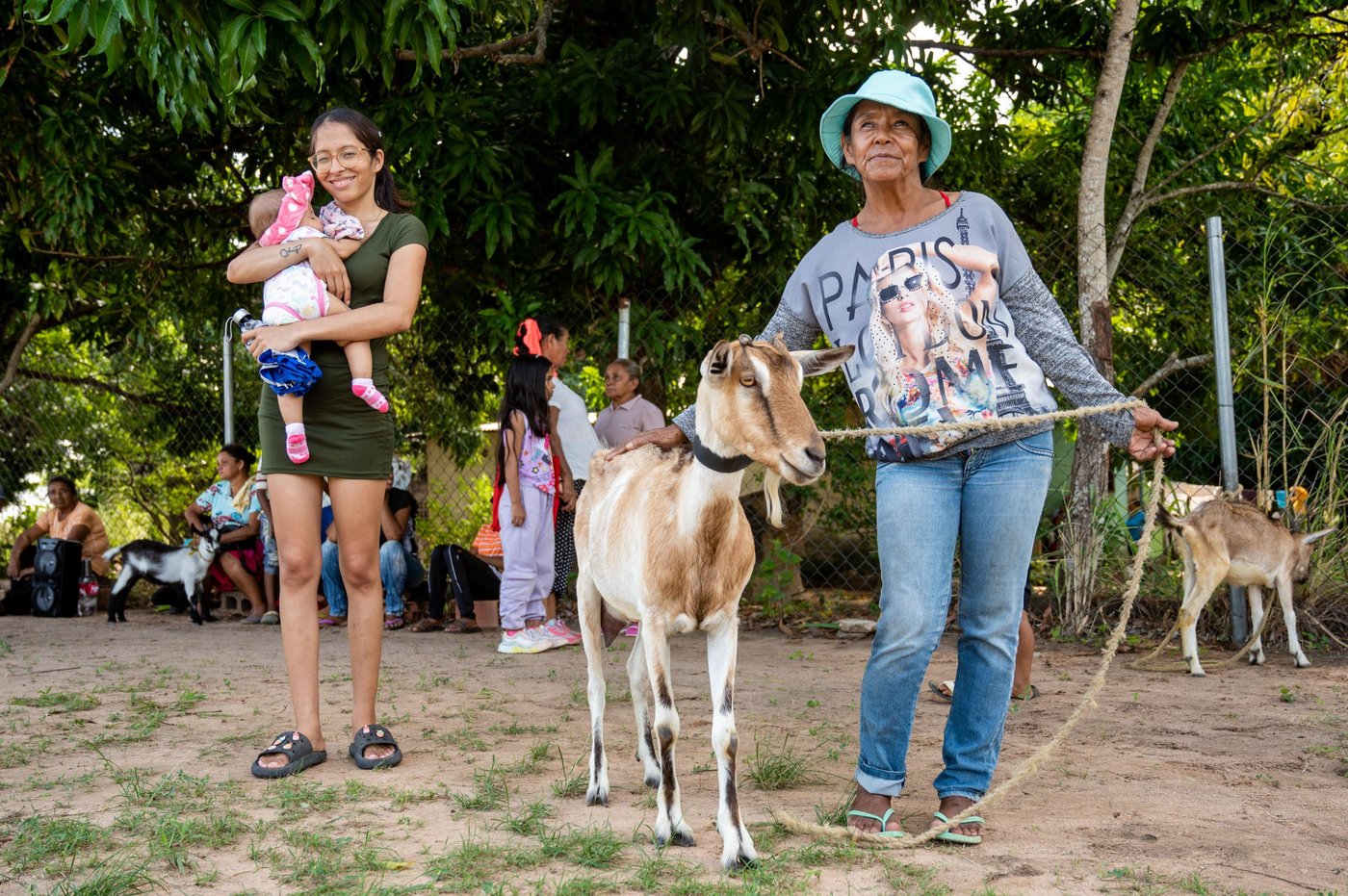
Although since 2022 Venezuela has shown signs of stabilisation and economic growth, the population continues to face limited access to essential services and economic opportunities, according to the United Nations. Some 7 million people still need humanitarian assistance.
The Norwegian Refugee Council (NRC) supported over 120 families in Cardozo between 2021 and 2023. The families received seeds and equipment that enabled them to create vegetable gardens next to their homes. Each family also received a livestock kit composed of eight broiler chickens, two laying hens, animal feed and vitamins. NRC also rehabilitated the community’s two greenhouses measuring 400 square metres each.
NRC’s support in Cardozo was generously funded by the Swiss Agency for Development and Cooperation (SDC).
“We successfully improved our diet,” says Yesenia, a 41-year-old mother of three. “People are now more enthusiastic about planting and having food in their yards so they can eat more tubers and vegetables on a daily basis.”
Yesenia tells us that the harvest of three planting cycles has especially benefitted older adults who live alone and children who attend the only school in the community.

Fresh milk at breakfast and homemade butter
“Feeding my children has become a little easier thanks to the goat’s milk,” says Elianys, a 21-year-old mother of two. “It used to be difficult for me to buy milk, but thanks to the goats, I now have it on hand.”
NRC prioritised support for families with children, pregnant women, and elderly people. Elianys and her husband received one of the 91 goats that NRC distributed in Cardozo. A year and a half later, the community’s herd has grown to 113 goats, of which 53 are pregnant.
Elianys now has two goats. She learned to milk the two litres that her goats produce each day. Her children and nephew start each morning with a glass of milk. She sometimes even makes butter.
“I can say with pride and joy that the children of our community are more beautiful every day because they drink goat's milk,” celebrates Wilfredo, a father of four and grandfather of many more.

NRC supported the establishment of an animal health unit in Cardozo, which monitors the health of the community’s livestock. With a veterinary kit at hand, they can directly address any medical issues.
The community dreams of building an agricultural centre housing all the livestock in a single space. The aim will be to craft various dairy products derived from goat’s milk.
“We need good facilities,” underlines Marlirio, 47, a farmer and leader of the local indigenous community.
Learning and collecting
NRC conducted workshops with families in Cardozo and taught them how to maintain their vegetable gardens. Topics included seed propagation, how to make organic fertilisers and pesticides, and how to manage the garden after harvest. Other sessions dealt with goat breeding and good practice for feeding, healthcare, and animal welfare. The workshops built on the community’s existing knowledge and experience of agriculture.
“How else could we have known about planting a shrub, propagating seedlings, what is useful for what, vaccinating, and helping the goats to give birth? Or knowing if any of them have udder inflammation or what medicine is useful for them?” lists Yesenia, satisfied with what she has learned.
NRC also developed training campaigns to support improved meal preparation for the community, including food hygiene and nutritional balance. In addition, the community received two manuals for horticultural and goat production.
“I didn't know anything about goats, but right now I have a buck goat [male goat] and, wherever I am, he obeys me,” says Marisol, a 63-year-old teacher. “Goats for us are a part of our families.”

The families of Cardozo want to become a model of a community-led organisation. “We are all one, but here we all have to work. That is what has given us results,” says Marisol. She is in charge of administration, and, together with Yesenia, coordinates the operations. Wilfredo sees to the transportation and Marlirio, to the communal assembly invitations.
By the end of NRC’s project, more than half of the households we worked with had improved their food consumption, and had increased access to fresh, locally grown food. Raising animals in the families’ backyards has diversified their diets. Now, the community is thinking of new ventures.
The self-organised collective has formed a social enterprise to be self-sustaining. The collective prepares cheese and sweets made from goat’s milk and maintains production of vegetables and legumes through seed donations from other organisations. They have also succeeded in buying a truck, tools, fertilisers, and pesticides. Local institutions regard them as technical trainers for other communities, and the collective dreams of establishing a farmhouse school.
“We have adopted the NRC team as part of our family, and we continue to tell them about everything that happens to us,” says Yesenia, with a smile on her face.
“The community has become stronger, it has grown and developed. We are more integrated and keener to work together,” says Wilfredo, who previously worked in the metal processing industry. NRC’s activities seek to provide alternatives in Bolivar, where the primary sector had been the main source of employment for many years, prior to the increased appeal of mining.

Sign up to our newsletter to read more stories from around the world.


